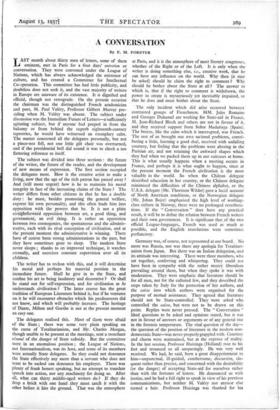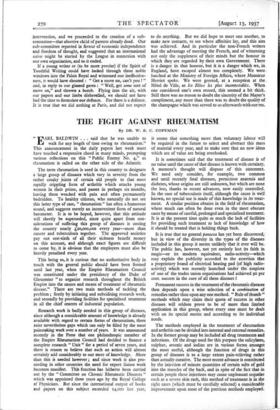A CONVERSATION
By E. M. FORSTER
LAST -month about thirty men of letters, some of them eminent, met in Paris for a four days' entretien or conversation. They were convened under the League of Nations, which has always acknowledged the existence of culture, and has created a Committee for Intellectual Co-operation. This committee has had little publicity, and doubtless does not seek it, and the vast majority of writers in Europe are unaware of its existence. It is dignified and official, though not retrograde. On the present occasion the chairman was the distinguished French academician and poet, M. Paul Valery, Professor Gilbert Murray pre- siding when M. Valery was absent. The subject under discussion was the Immediate Future of Letters--a-sufficiently agitating -subject, but if -anyone had peeped in from the balcony or from behind the superb eighteenth-century tapestries, he would have witnessed an exemplary calm. The matter concerned all the delegates personally, but not a pince-nez fell, not one little gilt chair was overturned, and if the presidential bell- did sound it was to check a too flattering reference to itself.
The * subject was divided into *three sections : the future of the writer, the future of the reader, and the development of new means of expression. The first section occupied the delegates most. How is the creative artist to make a living, no* that the age of the rich patron has paised away ? And (still more urgent) how is he to maintain his moral integrity in face of the increasing claims of the State ? The writer differs from other citizens in that he has a double duty : hi must, besides proinoting the general welfare, express . own personality, and this often leads him- into opposition with the poweri that be. It is not a plain straiglitfOrciard Opposition between art, a good thing, and goverrusient, an evil thing. It is rather an opposition between two cosmogonies, the spontaneous and the adminis- trative, each with its rival conception of civilisation, and at the present moment the administrative is winning. There have of course' been strong administrations in the past, but they have sometimes gone to sleep. The modern State never sleeps ; thanks to an • improved technique, it watches eternally, and exercises constant supetvision over all its children; The writer has to reckon with this, and it will determine his moral and perhaps his material position . in the immediate future. Shall he give in to the State, and confine his art to being laudatory and decorative'? bi shall he stand out for selfexpression, and for civilisation as he understands civilisation ? The latter course has the great tradition of European Literatute behind it, but if he ventures on it he will encounter obstacles which his predecessors did not know, and .which will probably increase. The heritage of Dante, Milton and Goethe is not at the present moment an easy one.
The delegates realised this. Most of them were afraid of the State ; there was some . very plain speaking on the curse. of Totalitarianism, and Mr. Charles Morgan, though unable to be present at the meetings, sent a trenchant résumé of the .danger of State subsidy. But the committee were in an anomalous position.; the League of Nations, not Internationalism, was its host, and some of its members were actually State delegates. . So they could not denounce the State effectively any more than a servant who does not want to be sacked can denounce his employer. . There was plenty of frank honest speaking, but Ito attempt to translate speech into action,. nor any .machinery for doing so. After.
what. can thirty. middle-aged writers 4 o.? If they do drop a .brick .with. one hand they -must catch it :with the other before it hits the ground. That was the atmosphere at Paris, and it is the atmosphere of most literary congresses, whether of the Right or of the Left. It is only when the writer is doing something else, i.e., creative work, that he can have any influence on the world. Why then (it may be asked) should he claim the right to comment ? Why should he bother about the State at all ? The answer to which is, that if the right to comment is withdrawn, the power to create is mysteriously yet inevitably impaired, so that he does and must bother about the State.
The only incident which did arise occurred between contrasted groups of Frenchmen. MM. Jules Romains and Georges Duhamel are working for State-aid in France, M. Jean-Richard Bloch and others are not in favour of it, and they received support from Senor Madariaga (Spain). The breeze, like the calm which it interrupted, was French. The rest of us brought, our own national problems, contri- buting a little, learning a good deal, received with unfailing courtesy, but feeling that the problems were altering in the Parisian air, and not retaining the awkward shapes which they had when we packed them up in our suitcases at home. This is what usually happens when a meeting occurs in France, and perhaps it _ is what ought to happen, since at the present moment the French civilisation is the most valuable in the world. So when the Chilean delegate described education in her country, or the Chinese delegate minimised the difficulties of the Chinese alphabet, or the. U.S.A. delegate (Mr. Thornton Wilder) gave a lucid account of North American conditions, or the Norwegian delegate (Mr. Johan Bojer) emphasised the high level of working-, class culture in Norway, there were no prolonged reverbera- tions. If the " Conversation " does have any practical result, it will be to define the relation between French writers and their own government. It is significant that of the two official League-languages, French was used as much as possible, and the English translations were sometimes perfunctory.
Germany was, of course, not represented at our board. No more was Russia, nor was there any apologia for Totalitari- anism from Japan. But there was an Italian delegation,. and its attitude was interesting. There were three members, who sat together, conferring and whispering. They could not have been in sympathy with the rather muzzy liberalism prevailing around them, but when they spoke it was with moderation. They were emphatic that literature should be for all men, not for the cultured few, and they described the steps taken. by Italy for the protection of her authors, and the caisse into which authors were organised for the purpose of mutual assistance. They agreed that literature should not be State-controlled. They were asked who controlled the caisse, but were not to be drawn on this point. Replies were never pressed. The " Conversation " liked questions to be asked and opinions stated, but it was not in favour of answers or arguments or of any general rise in the forensic temperature. The vital question of the day— the question of the position of literature in the modem non- democratic State—was never properly grappled with. Courtesy and charm were maintained, but at the expense of reality. In the last session, Professor Huizinga (Holland) rose to his feet and trounced us all unsparingly. He was very well received. We had, he said, been a great disappointment to him—unpunctual, ill-guided, cumbersome, discursive, elo- quent rather than precise, and concerned with the desirability (or the danger) of accepting State-aid for ourselves rather than with the fortunes of letters. He denounced us with justice, and he had a full right to speak in view of his previous communications, but neither M. Valery nor anyone else- turned a hair. Professor Huizinga was thanked for his intervention, and we proceeded to the creation of a sub- committee—that abortive child of parents already dead. Our sub-committee reported in favour of economic independence and freedom of thought, and suggested that an international caisse might be started by the League in connexion with our own organisation, and so it ended.
If a young writer or (to be more precise) if the Spirit of Youthful Writing could have looked through those noble windows into the Palais Royal and witnessed our ineffective- ness, it would have shouted : " Get a move on, can't you! " and, in reply to our glassed gazes : " Well, get some sort of move on," and thrown a bomb. Flying into the air, with our papers and our limbs dishevelled, we should not have had the time to formulate our defence. For there is a defence. It is true that we did nothing at Paris, and did not expect to do anything. But we did hope to meet one another, to make new contacts, to see where affinities lay, and this aim was achieved. And in particular the non-French writers had the advantage of meeting the French, and of witnessing not only the suppleness of their minds but the honour in which they are regarded by their own Government. There is a danger in that honour, but it is a danger which we, in England, have escaped almost too completely. We were lunched at the Ministry of Foreign Affairs, where Monsieur Herriot spoke. We were greeted, at a reception at the Hotel de Ville, as les Elites les plus incontestabks. When one considered one's own record, this seemed a bit thick.. Still there was no reason to doubt the sincerity of the Mayor's compliment, any more than there was to doubt the quality of the champagne which was served to us afterwards with our tea.







































 Previous page
Previous page